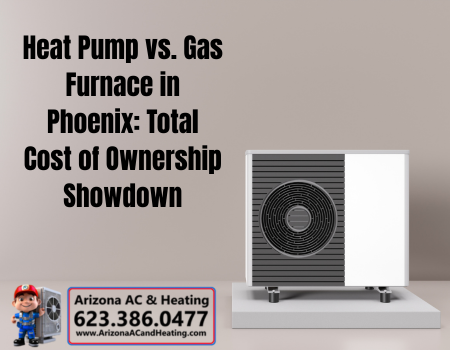Homeowners in Phoenix are always looking for ways to keep energy bills under control while staying comfortable in the desert’s extreme climate. When it comes to heating and cooling, two of the most common options are electric heat pumps and natural gas furnaces paired with traditional air conditioners. Both systems can keep your home comfortable year-round, but which offers the best total cost of ownership in Phoenix?
This comparison breaks down the key factors that determine long-term costs—installation, energy bills, maintenance, and lifespan—so you can make the best choice for your home.
 Upfront Installation Costs
Upfront Installation Costs
Installation cost is often the first thing homeowners notice, and there’s a difference between these systems. A new heat pump system, which handles both heating and cooling, typically costs between $7,000 and $12,000 to install in Phoenix, depending on the size and efficiency rating. Since a heat pump acts as both an air conditioner and heater, you don’t need separate equipment for heating.
A gas furnace with a central air conditioner, on the other hand, often has a lower starting cost for the heating unit. A gas furnace alone can cost $3,000 to $5,000 installed. But because you’ll also need a separate air conditioner to handle cooling, the total price tag usually lands between $8,000 and $13,000.
The gap in installation costs isn’t huge, but heat pumps often edge out furnaces because you’re installing one unit instead of two.
Energy Bills in Phoenix
Where you’ll see a big difference is in energy usage. Phoenix is a cooling-dominated climate, which means your AC (or heat pump in cooling mode) will run most of the year. In this environment, the efficiency of your cooling system matters more than your heating system’s efficiency.
Heat pumps are extremely efficient because they move heat instead of creating it. In Phoenix, they work extremely well in cooling mode, offering SEER2 ratings similar to high-efficiency air conditioners. When temperatures dip in the winter, a heat pump can still heat your home efficiently without burning fuel.
Gas furnaces, by contrast, burn natural gas for heat and rely on an electric air conditioner for cooling. While gas may be cheaper than electricity on a per-unit basis, you’ll use your furnace only a few weeks out of the year. The air conditioner will drive most of your energy bills.
On average, a heat pump will reduce annual energy costs by 10–20% compared to a standard gas furnace and AC combo in Phoenix. Those savings add up significantly over a 10- to 15-year lifespan.
Maintenance and Repairs
Maintenance costs are similar for both systems, but there’s a slight edge for heat pumps. A heat pump is a single system with fewer components than a separate furnace and AC, which means fewer things can break. Annual maintenance on a heat pump in Phoenix typically costs $150–$300, about the same as maintaining a furnace and AC system individually.
Gas furnaces have additional components—like burners, heat exchangers, and flue pipes—that require inspection and can fail over time. Repairs for gas furnaces can be more expensive, especially if major components like the heat exchanger fail.
Lifespan and Replacement Costs
A well-maintained gas furnace can last 20–25 years, but the central AC unit will likely need replacement every 12–15 years. That means you may be replacing the cooling system once or even twice during the furnace’s lifespan.
Heat pumps generally last 12–15 years, which is comparable to an air conditioner. However, because they’re used year-round, their wear and tear is higher than a furnace that only runs in the winter. Still, the lack of a separate AC replacement can even out the cost over time.
Total Cost of Ownership
When you factor in all of these variables, heat pumps usually come out ahead in Phoenix’s climate. The lower energy bills and single-unit installation offset the slightly shorter lifespan. Over 15 years, the total cost of ownership for a heat pump can be $3,000–$5,000 less than a gas furnace and AC combo, particularly for homeowners who invest in a high-efficiency unit.
Gas furnaces may still make sense for certain households. If you already have natural gas infrastructure in place, or if you prefer the quick, warm blast of heat a furnace provides on chilly winter mornings, the comfort factor might outweigh the extra cost.
Phoenix’s mild winters and long cooling season make heat pumps an excellent choice for most homeowners. They’re energy-efficient, cost-effective over the long term, and can keep your home comfortable year-round without the need for a separate air conditioner.
Before you decide, get quotes from reputable HVAC contractors for both systems and compare the full scope of costs, including energy usage estimates. Whichever system you choose, regular maintenance will maximize performance and ensure you get the best possible return on your investment.
